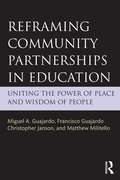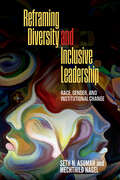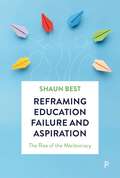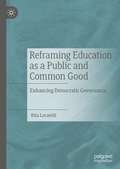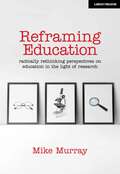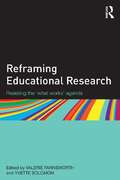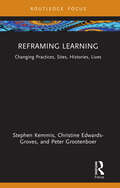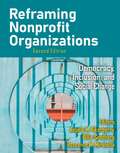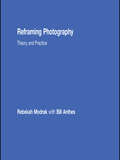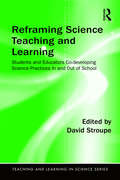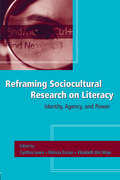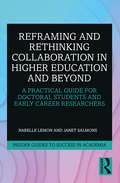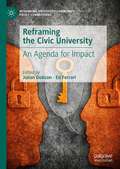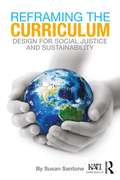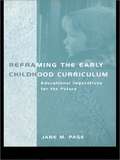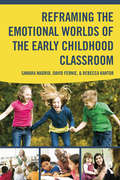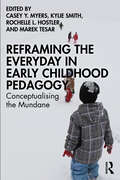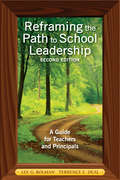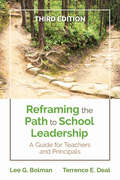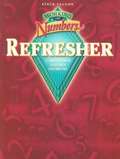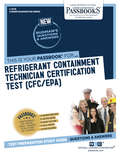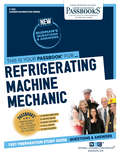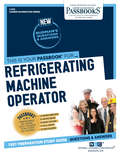- Table View
- List View
Reframing Community Partnerships in Education: Uniting the Power of Place and Wisdom of People
by Miguel A. Guajardo Francisco Guajardo Christopher Janson Matthew MilitelloReframing Community Partnerships in Education provides both the theoretical framework as well as a practical guide to engage educators in interdisciplinary, inter-organizational, multicultural, and multi-generational work to improve the social fabric of communities. Using case examples of best practice, this book explores transformational practices for community development, community building, and civic engagement. Featuring "Community Learning Exchange" pedagogies adaptable to a wide range of contexts, this book encourages educators—through use of participatory practices and a collective leadership model—to build stronger communities and advance learning for all.
Reframing Diversity and Inclusive Leadership: Race, Gender, and Institutional Change
by Mechthild Nagel Seth Nii AsumahHow can we tackle racism and sexism on our college and university campuses? What is the role of education leaders in advancing social justice? Reframing Diversity and Inclusive Leadership addresses the urgent need for more than merely performative gestures toward—and a redoubled, authentically engaged investment in—diversity, equity, and inclusion (DEI). Seth N. Asumah and Mechthild Nagel examine how traditional leadership models have tended to exacerbate racial and gender inequities in United States higher education and society at large. Using a cross-cultural, comparative approach indebted to critical race theory, critical whiteness studies, and Black feminism, Asumah and Nagel draw on decades of combined experience in the US and globally to provide a framework for inclusive leadership practices, actions, and policies. A valuable resource for administrators, faculty, students, and political and industry leaders, Reframing Diversity and Inclusive Leadership responds to calls for justice on campuses and beyond.
Reframing Education Failure and Aspiration: The Rise of the Meritocracy
by Shaun BestEducation is considered central to social mobility and, following a drive to raise learners’ aspirations, an ‘aspiration industry’ has emerged. However, the desire to leave school early should not be regarded as evidence of students lacking ambition. This book traces the emergence of the aspiration industry and argues that to have ambitions that do not require qualifications is different, but not wrong. Reviewing the performance of six schools in England, their Ofsted reports and responses, it evaluates underpinning assumptions of what makes an effective school. This book critically examines neo-liberal education policy developments, including the 1988 Education Reform Act, and the political discourse around changing explanations of education ‘failure’ with the rise in the marketisation of education.
Reframing Education as a Public and Common Good: Enhancing Democratic Governance
by Rita LocatelliThis book examines the normative principles that guide the governance of education, in particular the notion of education as a public good. Determining whether this concept is still valid is a topic of growing importance, especially considering the phenomena of increasing privatisation and marketisation in the sector. The author posits that the prioritisation of economic aspects of education may lead to the weakening of the role of the State in ensuring equality of opportunity and social justice, and thus to a significant risk of considering education as merely a private, marketable good. The volume argues that considering education as a common good can lead to the strengthening of democratic and participatory approaches to educational governance, based on the recognition of education as a shared endeavour and responsibility. It will be of interest and value to students and scholars of education as a public good, social justice, and the wider neoliberalisation of the education sector.
Reframing Education: Radically rethinking perspectives on education in the light of research
by Mike MurrayMike Murray's excellent new book attacks the narrow high stakes accountability and marketized vision which has distorted our education system, the fragmentation of education thinking into warring camps and silos and offers a radical optimistic vision of how we can emerge from the current impasse.Perfect for teachers or school leaders who want to engage with research and move the education system in a radical future direction.
Reframing Education: Radically rethinking perspectives on education in the light of research
by Mike MurrayMike Murray's excellent new book attacks the narrow high stakes accountability and marketized vision which has distorted our education system, the fragmentation of education thinking into warring camps and silos and offers a radical optimistic vision of how we can emerge from the current impasse.Perfect for teachers or school leaders who want to engage with research and move the education system in a radical future direction.
Reframing Educational Research: Resisting the 'what works' agenda
by Valerie Farnsworth Yvette SolomonPossibilities for the use of research in educational practice are often written off due to the history, politics and interests of the ostensibly separate worlds that researchers and practitioners occupy. However, a more optimistic account highlights the ways these communities share a common need for practice-based theories, which enable them to make sense of a wide range of issues in education, including pedagogy, learning, and educational equity. In applying theory to situated accounts of various educational practices and learning contexts, this book explores mistaken assumptions about the ways that research can ‘inform’ or otherwise impact practice. It problematises a ‘what works’ agenda but also points to potentially more productive research-practice relationships in education. Experienced contributors describe how they have used a variety of context-sensitive theoretical approaches in the socio-cultural and discursive traditions to both understand practice and address a wide range of practical issues in education. At its core Reframing Educational Research challenges two commonly held assumptions: that "best practice" is readily identifiable in a way that is then transferrable to new contexts for use by practitioners more widely, and that theory will not help with what to do on Monday morning in the classroom or in developing policies with direct and visible impact. Drawing on the experience of a number of highly respected expert contributors, including Mel Ainscow, Harry Daniels, Anna Sfard and Etienne Wenger-Trayner, the book discusses a range of issues that must be explicitly addressed if we are to make headway in developing a sustainable and productive relationship between research, policy and practice. The authors make it clear that the politics, policies, institutional practices, market systems and social dynamics currently at play in education have a tendency to derail the idealised pathway from research to reform. This book aims to move the discussion towards alternative, and potentially more fruitful, ways of linking research with practice. Reframing Educational Research is an invitation to all researchers to identify new opportunities for advancing theory and practice in education. It is a must-read for all practitioners and researchers in education.
Reframing Learning: Changing Practices, Sites, Histories, Lives (Routledge Research in the Sociology of Education)
by Stephen Kemmis Christine Edwards-Groves Peter GrootenboerDisrupting the individualism of much conventional psychological research into learning, this book presents a situated, practice-based understanding of learning, based on the theories of situated learning and practice architectures, conceptualising learning as ontological transformation. While accepting that learning is consequential for learners, this book explores how learning matters for and in the world. The authors present a view of learning not just in the context of the lives of learners and those around them, but as part of the dynamic and organic site-ontological processes of world-historical and ecological change. While learners may be stars in their own lives and learning, they are also living, agentic beings who are part of Earth’s community of life and who respond to the changing world in ways that are consequential beyond their own lives. The book explores the place of learning from the point of view of the world as much as from the point of view of the learner. Distinctively, the book conceptualises learning as a social accomplishment and as a process that changes the worlds beyond individual learners.A groundbreaking contribution from the leading scholars in the field, this book will be of great interest to scholars, researchers, and post-graduate students of education, social science, and philosophy, and the specific fields of professional practice, practice theory, learning sciences, and sociology.
Reframing Nonprofit Organizations: Democracy, Inclusion, and Social Change
by Roseanne M. Mirabella Angela M. Eikenberry Billie SandbergNow more than ever, students of nonprofit and voluntary organization management need tools, methods, and case studies that enable them to critically think about how to not only cope with, but also change, the environments in which they work. This book serves as a critical companion to other nonprofit management textbooks, providing students with an opportunity to rethink unquestioned assumptions about nonprofit and voluntary organizations and their management and to challenge the status quo, providing an avenue for lively and engaging classroom discussions. Each chapter addresses important topics of nonprofit and voluntary organization management—including board governance, leadership, government relations, and human resource, financial, and volunteer management—applying critical perspectives to very practical case studies and examples. Concepts covered are understandable to anyone regardless of previous knowledge or background and introduce more interesting and inspiring content to students.
Reframing Photography: Theory and Practice
by Bill Anthes Rebekah ModrakTo fully understand photography, it is essential to study both the theoretical and the technical. This book combines theory and practice in one text, exploring photographic ideas alongside processes.
Reframing Science Teaching and Learning: Students and Educators Co-developing Science Practices In and Out of School (Teaching and Learning in Science Series)
by David StroupeResponding to recent reform efforts, such as the Next Generation Science Standards, which call for students to learn science practices, this book proposes a conceptual reframing of the roles of teachers and students in formal and informal science learning settings. Inviting the field to examine the state of "science practice," it provides concrete examples of how students, supported by the actions of educators, take on new roles, shifting from passive recipients of information to active participants in conceptual, social, epistemic, and material features of science work. Each chapter provides an examination of how and why science practice evolves in learning communities in which students and teachers negotiate disciplinary work; an analysis of how specific pedagogical and social actions taken by someone with authority (a teacher or other educator) provides opportunities for students to shape science practices; a set of concrete recommendations for working with young students in formal and informal learning settings; and a set of suggestions and questions to catalyze future research about and the evolving relationships between educators, students, and science practices in the field of science education. Showing how and why the conceptual ideas presented are important, and providing specific, actionable suggestions for teachers and other educators for their daily work, this book includes both elementary and secondary learning sites.
Reframing Sociocultural Research on Literacy: Identity, Agency, and Power
by Cynthia Lewis Elizabeth Birr Moje Patricia EncisoThis landmark volume articulates and develops the argument that new directions in sociocultural theory are needed in order to address important issues of identity, agency, and power that are central to understanding literacy research and literacy learning as social and cultural practices. With an overarching focus on the research process as it relates to sociocultural research, the book is organized around two themes: conceptual frameworks and knowledge sources. *Part I, “Rethinking Conceptual Frameworks,” offers new theoretical lenses for reconsidering key concepts traditionally associated with sociocultural theory, such as activity, history, community, and the ways they are conceptualized and under-conceptualized within sociocultural theory.*Part II, “Rethinking Knowledge and Representation,” considers the tensions and possibilities related to how research knowledge is produced, represented, and disseminated or shared—challenging the locus of authority in research relationships, asking who is authorized to be a legitimate knowledge source, for what purposes, and for which audiences or stakeholders. Employing the lens of “critical sociocultural research,” this book focuses on the central role of language and identity in learning and literacy practices. It is intended for scholars, researchers, and graduate students in literacy education, social and cultural psychology, social foundations of education, educational anthropology, curriculum theory, and qualitative research in education.
Reframing and Rethinking Collaboration in Higher Education and Beyond: A Practical Guide for Doctoral Students and Early Career Researchers (Insider Guides to Success in Academia)
by Janet Salmons Narelle LemonThe 'Insider Guides to Success in Academia' offers support and practical advice to doctoral students and early-career researchers. Covering the topics that really matter, but which often get overlooked, this indispensable series provides practical and realistic guidance to address many of the needs and challenges of trying to operate, and remain, in academia. These neat pocket guides fill specific and significant gaps in current literature. Each book offers insider perspectives on the often implicit rules of the game - the things you need to know but usually aren't told by institutional postgraduate support, researcher development units, or supervisors - and will address a practical topic that is key to career progression. They are essential reading for doctoral students, early-career researchers, supervisors, mentors, or anyone looking to launch or maintain their career in academia. Reframing and Rethinking Collaboration in Higher Education and Beyond delves deep into a Taxonomy of Collaboration underpinned by mindful choices – being present, aware, non-judgemental, curious and open – while also considering your and others’ strengths. In looking at how higher degree research students and early career researchers can approach collaboration, this book unpacks what collaboration is and points to the specific knowledge, skills, and abilities associated with achieving collaborative advantage. Covering a range of issues in a variety of contexts, this book: Helps you understand the meaning and value of working collaboratively. Prepares you for success in collaborative academic and postgraduate career activities. Invites you to use models, including the Taxonomy of Collaboration, to plan your collaborative projects. Explains options for different situations through realistic examples of commonly experienced collaborative issues or problems. Encourages you to think about collaboration from a strengths-based approach. Offers practical strategies for you can use to plan, organise and participate in collaborative activities, including ways to deal with problems and resolve conflicts. Full of practical tips, case studies, real life situations and lived experiences, this book offers strategies that can be used in online or hybrid collaborations and is ideal reading for anyone interested in finding out how to make collaborative practice work for them.
Reframing the Civic University: An Agenda for Impact (Rethinking University-Community Policy Connections)
by Julian Dobson Ed FerrariThis book addresses the need for a comprehensive reappraisal of what it means to be a ‘civic university’. For two decades the ‘civic’ agenda has been driven by a concern with economic impact and regional economic development. While recognising the importance of these aspects of universities’ civic influence, there is a need to more comprehensively outline how universities can and should make a difference across a wide spectrum of place-based activity, against a background of intensifying global social and environmental challenges. Rooted in collaborative work by the Civic University Network and community-based partners, the book provides a clear logical framework that universities and their partners can use to examine the extent of their civic activities, but also challenges them to use that framework as a starting point for deeper reflection and engagement. It celebrates the actions universities have taken to respond to communities’ needs, and encourages them to think more rigorously about what they can do in the future, and how they can become more accountable to the communities they serve. The book is an essential read for university leaders, academics involved in public engagement, and civic leaders and representatives who wish to develop closer engagement with their local universities.
Reframing the Curriculum: Design for Social Justice and Sustainability (Kappa Delta Pi Co-Publications)
by Susan SantoneReframing the Curriculum is a practical, hands-on guide to weaving the concepts of healthy communities, democratic societies, and social justice into academic disciplines. Developed for future and practicing teachers, this volume is perfect for teacher education courses in instructional design, social foundations, and general education, as well as for study in professional learning communities. The author outlines the philosophies, movements, and narratives shaping the future, both in and out of classrooms, and then challenges readers to consider the larger story and respond with curriculum makeovers that engage students in solving problems in their schools, communities, and the larger world. The book’s proven method for designing units gives educators across grades and disciplines the tools to bring sustainability and social justice into experiential, project-based instructional approaches. Pedagogical features include: Specific examples and templates that offer readers a framework for reworking their units and courses while meeting required standards and incorporating innovative classroom practices. Activities and discussion questions that bring the content to life and establish ties with the curriculum. eResources, including a Facilitator’s Guide, offering examples of fully developed units created with this model and an editable template for redesigning existing units.
Reframing the Early Childhood Curriculum: Educational Imperatives for the Future
by Jane PagePre-school children have fundamentally different attitudes towards the future and attendant notions of time and space. For this reason, early childhood professionals are optimally placed to lay important foundations for young children's long term development. Children's flexibility of thought, their positive and constructive outlook on life, their sense of the continuity of time, their creativity and imagination, and their sense of personal connection with time and the future, are all qualities that should be recognized and addressed in early childhood educational programmes as a means of counteracting the difficulty youths experience in knowing what to expect in their future lives and coming to understand their roles in shaping them.Reframing the Early Childhood Curriculum offers fresh insight into:* examining futurists' and early childhood theorists' thinking of the relevance of planning for children's long term needs in early childhood* identifying the skills, attitudes and outlooks required to assist young children attending early childhood programmes in their long term growth and development* exploring the means through which these skills, attitudes and outlooks can be achieved in curriculum frameworks through specific goals and learning experiences against the background of youth and young children's views of the future.
Reframing the Emotional Worlds of the Early Childhood Classroom
by Samara Madrid David Fernie Rebecca KantorThis volume examines the emotional world of the early childhood classroom as it affects young children (whose emotional wellbeing is crucial to successful learning), educators (for whom teaching is never a solely cognitive act), parents, and administrators. In a culture where issues such as bullying and teacher burnout comprise major challenges to student success, this book brings together diverse voices (researchers, practitioners, children, and parents) and multiple perspectives (theoretical and personal) to refocus attention on the pivotal role of emotion in schools. To do so, editors Samara Madrid, David Fernie, and Rebecca Kantor envision emotion as a dynamic, fluid, and negotiated construct, performed and produced in the daily lives of children and adults alike. A nuanced yet cohesive analysis, Reframing the Emotional Worlds of the Early Childhood Classroom thus presents a challenge to the overriding concern with quantifiable classroom achievement that increasingly threatens to push the emotional lives of classroom participants to the margins of educational and public discourse.
Reframing the Everyday in Early Childhood Pedagogy: Conceptualising the Mundane
by Kylie Smith Marek Tesar Casey Y. Myers Rochelle L. HostlerDespite vast possible differences across geographic locations, cultural practices, community values, and curricular priorities, there are everyday events that are intimately familiar in the context of early childhood care and education centres. By attending to the daily events that are often overlooked and considerably under-theorized, this insightful text highlights the complexity of the everyday in early childhood settings. Contributions to this edited collection are organized to follow the chronology of a school day; each chapter draws upon post-foundational theories and empirical qualitative data in order to (re)examine a familiar routine within an early years centre, such as walking down the hallway, eating a snack, napping, or changing one’s clothing. The authors argue for a mundane early childhood praxis that attends to the pedagogical possibilities within the seemingly unremarkable and highlights its importance, especially during what are understood to be unprecedented times. This book will be of interest to advanced practitioners, graduate students, and scholars, and for use in courses in early childhood education, childhood studies, and educational foundations.
Reframing the Path to School Leadership: A Guide for Teachers and Principals
by Lee G. Bolman Terrence E. DealPowerful mental tools for navigating the complicated issues of everyday school life! Ideal for new and experienced educators, this second edition of the bestseller presents dialogues between a novice and a master teacher and between a new and a seasoned principal to illuminate how reframing challenges can generate tremendous potential for classroom and school leadership. This updated edition provides leadership lesson summaries, solid strategies, and reflective questions that help teachers and principals grow through the use of four defining lenses: Political: individual versus group power Human resources: individual needs and motives Structural: clear goals and responsibilities Symbolic: culture, meaning, belief, and faith
Reframing the Path to School Leadership: A Guide for Teachers and Principals
by Lee G. Bolman Terrence E. DealThe indispensable leadership companion—updated and more relevant than ever! Part leadership manual, part short novel, this unique best-seller uses dialogues between a novice and a master teacher and between a new and a seasoned principal to illuminate how the simple act of viewing a problem through different lenses—political, human resources, structural, or symbolic—can reveal better options and solutions. Featuring reflective questions and solid strategies for meeting real-life challenges, the third edition also includes New views on building morale in challenging times A revamped discussion of mandates, standards, and rubrics A celebration of educators as skilled professionals Expanded conversations about hope, faith, and parental involvement Sometimes all it takes to solve a problem is to reframe it by listening to wise advice from a trusted mentor.
Reframing the Path to School Leadership: A Guide for Teachers and Principals
by Lee G. Bolman Terrence E. DealThe indispensable leadership companion—updated and more relevant than ever! Part leadership manual, part short novel, this unique best-seller uses dialogues between a novice and a master teacher and between a new and a seasoned principal to illuminate how the simple act of viewing a problem through different lenses—political, human resources, structural, or symbolic—can reveal better options and solutions. Featuring reflective questions and solid strategies for meeting real-life challenges, the third edition also includes New views on building morale in challenging times A revamped discussion of mandates, standards, and rubrics A celebration of educators as skilled professionals Expanded conversations about hope, faith, and parental involvement Sometimes all it takes to solve a problem is to reframe it by listening to wise advice from a trusted mentor.
Refresher: Computation Algebra Geometry
by Steck-VaughnReading and Writing Numbers This Refresher book is the most comprehensive of its kind, covering basic computation through algebra and geometry skills.
Refrigerant Containment Technician Certification Test: Passbooks Study Guide (Career Examination Series)
by National Learning CorporationThe Refrigerant Containment Technician Certification Test Passbook® prepares you for your test by allowing you to take practice exams in the subjects you need to study. It provides hundreds of questions and answers in the areas that will likely be covered on your upcoming exam.
Refrigerating Machine Mechanic: Passbooks Study Guide (Career Examination Series)
by National Learning CorporationThe Refrigerating Machine Mechanic Passbook® prepares you for your test by allowing you to take practice exams in the subjects you need to study. It provides hundreds of questions and answers in the areas that will likely be covered on your upcoming exam, including but not limited to: operation, maintenance and repair of pumps, motors, valves, mechanical and electrical equipment; reading and interpretation of plans and specifications; inspection, operation, maintenance and repair of basic mechanical equipment; tools of the trade (mechanical); principles and practices of air conditioning and refrigeration; and more.
Refrigerating Machine Operator: Passbooks Study Guide (Career Examination Series)
by National Learning CorporationThe Refrigerating Machine Operator Passbook® prepares you for your test by allowing you to take practice exams in the subjects you need to study. It provides hundreds of questions and answers in the areas that will likely be covered on your upcoming exam.
